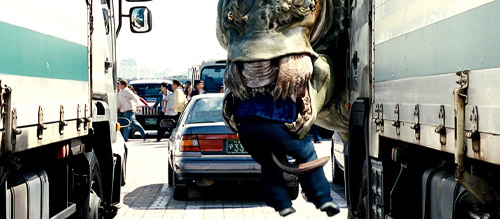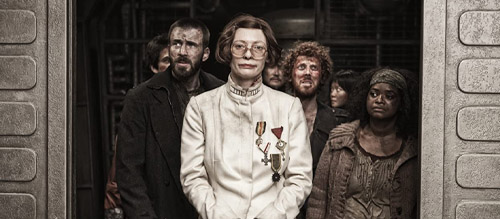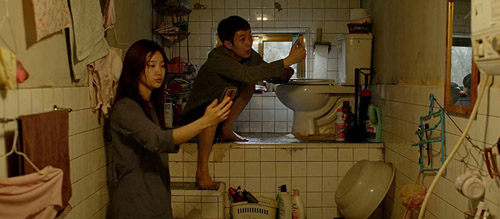Where to Start with Bong Joon-ho
Cast your mind back ten, maybe even just five years and not that many people outside of South Korean audiences and ardent cinephile circles would have heard of Bong Joon-ho. But then the 2019-20 film awards season happened and to cap off its already monumental run of success, Parasite made “Director Bong” the first Korean Best Picture and Best Director winner, and the first director of a film not in the English Language in Oscars history to take home the Academy’s top prize.
Bong was born in Daegu, South Korea in 1969, but relocated to Seoul with his family when he was young, becoming active in pro-democracy demonstrations whilst studying at university, where he also made his first short films. He honed his craft by enrolling at the Korean Academy of Film Arts before his early features found an audience in his homeland and beyond.
Directing seven feature films over 20 years, Bong’s style, particularly the way in which he juggles diametrically opposing tones from scene to scene or even shot to shot and how he tactically deploys dark comedy alongside very serious subject matter, is bizarrely unique enough to be off-putting to some viewers. He could be considered an acquired taste, and as his films are not easy to pigeonhole and rarely, if ever, fit neatly into a single genre, they can be a difficult sell to anyone not already familiar or who hasn’t stumbled onto them by happy accident.
Memories of Murder is arguably Director Bong’s best film, his first masterpiece that often tops South Korean Best of All Time lists, but its elastic tone, springing between slapstick sitcom to portrayals of police brutality and rape-murder, and the unapologetic ambiguity of the re-telling of this true-crime story full of challenging characters, means it’s not for everyone and is perhaps one viewing experience that should be steadily built up to. But there’s more than just one all-time great entry into film canon to be explored in Bong Joon-ho’s directorial catalogue.
Where should you start with Bong’s other films? Here, in the latest in The Film Magazine’s Where to Start With series, are our recommended points of entry into Bong Joon-ho’s filmography.
1. The Host (2006)
The Host Review
Though Barking Dogs Never Bite was a cult hit and Memories of Murder made a splash with critics, The Host can be considered Bong’s international breakthrough as not only did it break domestic box office records in Korea but it saw fair success on DVD among genre fans in the West as well.
Like all great monster movies, The Host is not really about the monster. This is all about the troubles of a highly dysfunctional working-class family; a family who were struggling to remain together even before a giant newt crawled out of the Han river and abducted their youngest. It’s this Park family unit, their squabbles and their deep, unconditional love for each other that is the most compelling aspect of The Host. They are all fallible people and speak to Bong’s fascination with flawed human beings and the stupid things they will do under pressure. Gang-doo (Song Kang-ho) is a useless layabout, his younger brother and sister (Park Hae-il and Doona Bae) a drunk teacher and a failed athlete respectively, the dad (Byun Hee-bong) demanding and cold towards his children.
You have the typically black comic Bong Joon-ho scene of the Park family rolling around hysterically squabbling on the ground in front of a shrine to the monster’s victims, but you also get a lot of genuine warmth from young Hyun-seo (Ko A-sung) caring for a little boy who has also been taken by the monster. There is also a fair amount of fury at government incompetence and American interference with the lives of ordinary Koreans for half a century, here symbolised by their unfeeling dumping of toxic chemicals into a major water supply and subsequent strong-arming of an inept Korean government into unleashing a second chemical weapon to kill the monster.
This is a real crowd-pleaser, rarely losing pace after the inciting action scene, morphing into a mini-heist movie peppered with gags as we move into the final act that brings catharsis and heart with it as the Park family are finally able to work together to fight back against the monster and thereby stand against any force on earth that would dare tear them apart again.
2. Snowpiercer (2013)
Snowpiercer Review
Bong Joon-ho’s mostly-English-language debut retains his offbeat sensibility and strong political subtext whilst also starring Captain America (Chris Evans) as the leader of a rebellion. The social upheaval and survival themes are universal, particularly now we’ve lived through the last few years of change (mostly for the worse), but the presentation is uniquely Director Bong’s, the voice distinctly South Korean.
Despite attempted producer meddling behind the scenes, purportedly to dumb the film down for the average viewer (it was one of Harvey Weinstein’s final projects), Bong stuck to his guns and produced something that is at times flawed but is endlessly fascinating to return to. Again, he’s an acquired taste of a filmmaker and will perhaps never fully be embraced by the mainstream, but those who love his films and his sensibilities really love them (there’s a reason #Bonghive blew up so much in 2020).
Snowpiercer takes us to the near-future as a massive train transports the remnants of humanity across an ice age landscape caused by a botched attempt to stop global warming. The rich and the powerful live in luxury at the head of the train, and the poor and the powerless barely survive in squalor at the tail. Everything changes when a group of scrappy revolutionaries led by Curtis (Chris Evans) begin to battle their way towards the front of the train to redress the balance of power.
The satire here is delivered with a sledgehammer, the bad guys (particularly Tilda Swinton’s half-Thatcher, half-Scargill bureaucrat Mason) are cartoon characters prone to on-the-nose speechifying about proper placement of things and people, but Snowpiercer does keep you engaged and thinking about things beyond how cool the viscerally brutal tunnel fight is (and it is a very cool sequence). This is Bong’s dark vision presented through the prism of a blockbuster, complete with action suspense and some incredibly dark twists that come thick and fast in the final act.
3. Parasite (2019)
Parasite Review
Bong’s game-changing Oscar-winner managed to please everyone, satisfying fans, critics and even a lot of general audiences who would usually be reluctant to watch a Korean black-comedy-drama. Bong’s Oscars speech about getting past the barrier of subtitles, of embracing films from across the world, was easily one of the most important things ever said at the Academy Awards.
Social upheaval and operatic themes and imagery were the name of the game here, all presented in the constantly shifting power dynamic between two very different families. The poor Park family grift the rich Kim family by masquerading as “the help” and ousting the Kim’s existing staff to get a taste of a better life. But as it becomes increasingly unclear as to who is playing who and dark secrets are unearthed as the Parks spend more and more time unsupervised in the Kim house, events come to a decisively destructive end.
Parasite is one of a select few Best Picture winners fully deserving of all the hype and is the perfect distillation of all Director Bong’s fascinations and auteur trademarks. Like The Host but more so, you get two dysfunctional families unhealthily working out their myriad issues for the price of one, and like Snowpiercer but with far more nuance he is examining and deconstructing inequality and what makes it so prevalent in every society. It’s the richest of tapestries and the most fascinating of Bong’s films to revisit time and time again.
There are painterly images in Parasite you could hang in a gallery, and others that will cause such visceral reactions as spasms of unintended should-I-really-be-laughing guffaws or spine-chilling shudders. You may not like every character but you can feel for them all and you will not guess exactly what each character’s ultimate endgame is. The film sweeps you up in an at times uncomfortable embrace, keeps squeezing and refuses to let go, but you come out the other side a more enlightened, considerate and thoughtful human being.
Recommended for you: Bong Joon-ho Films Ranked
Bong Joon-ho is a unique filmmaking auteur, a mischievous entertainer, satirist and philosopher who is distinctly Korean but a universal communicator. If you have yet to get into his fascinating films, now is the perfect time. Use this piece as your guidebook and see how you get on; it may be your first step into a larger world. After all, “Once you overcome the one-inch-tall barrier of subtitles, you will be introduced to so many more amazing films”.




